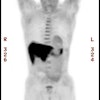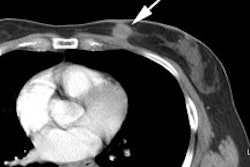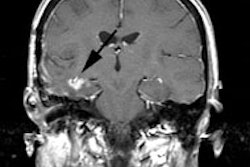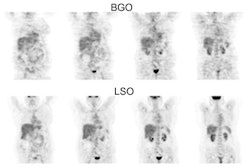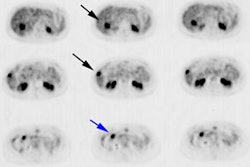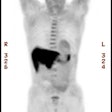Turlakow A, Yeung HW, Salmon AS, Macapinlac HA, Larson SM.
Peritoneal carcinomatosis can be difficult to diagnose, as CT is insensitive, with peritoneal biopsy and lavage often subject to problems of sampling error. The aim of our study was to evaluate the role of (18)F-FDG PET in detecting peritoneal carcinomatosis in patients with stomach, ovarian, and adrenal cancer and mesothelioma and to compare the results with CT scans in the same patient group. Our secondary aim was to identify characteristic patterns of abdominal (18)F-FDG uptake in biopsy-proven peritoneal disease and to correlate these patterns with available histologic and anatomic findings after surgery and structural imaging. METHODS: The medical records of 88 patients with stomach (n = 48), ovarian (n = 13), and adrenal cancer (n = 6) and mesothelioma (n = 21) were reviewed for the presence of peritoneal tumor on (18)F-FDG PET and CT scans. The results were correlated with either contemporaneous peritoneal biopsy or ascitic aspirate or with radiographic or clinical follow-up if histology was negative or unavailable. Of 24 patients with suspected peritoneal tumor, 17 had biopsy-proven findings of peritoneal disease. RESULTS: Of the 24 patients with suspected peritoneal tumor, (18)F-FDG PET was positive in 14 patients, with 1 of these scans being false-positive, CT was positive in 10 patients, and either PET or CT was positive in 18 patients. This yielded sensitivities of 57% (13/23), 42% (10/23), and 78% (18/23), with uniformly high positive predictive values of 93% (13/14), 100% (10/10), and 95% (18/19), respectively. We identified 2 distinctly abnormal scintigraphic patterns of focal and uniform (18)F-FDG uptake corresponding to nodular and diffuse peritoneal disease on pathologic examination. CONCLUSION: (18)F-FDG PET adds to conventional imaging in the staging of peritoneal carcinomatosis. It is also a useful diagnostic tool when peritoneal biopsy is either unavailable or inappropriate. We have identified 2 distinct scintigraphic patterns that appear to predict the presence of either nodular or diffuse peritoneal pathology.
